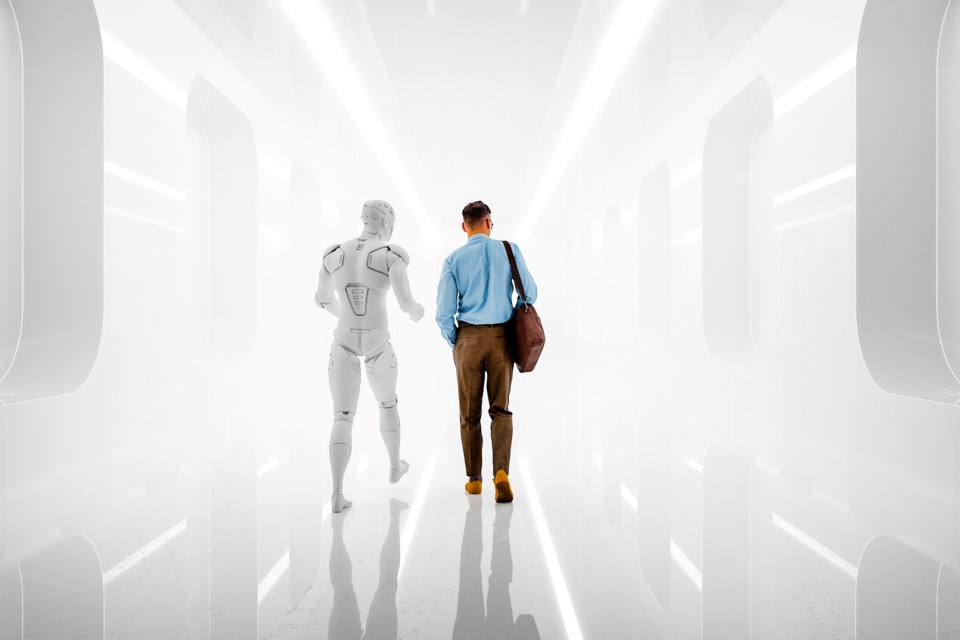Ten months after being urged to change the labour code to address artificial intelligence, the B.C. government is still considering its response.
In February 2024, the province asked a three-person panel to review the B.C. Labour Relations Code and propose needed changes.
Their report included recommended changes that would give unions more power to require consultation with employers over the introduction of AI tools.
And while the panel and some unions are urging the government to take action, it says it’s not ready to discuss AI legislation until a public consultation process is complete.
The labour code currently requires collective agreements to contain provisions for regular union-employer consultations to “promote the co-operative resolution of workplace issues, to respond and adapt to changes in the economy, to foster the development of work related skills and to promote workplace productivity.”
The panel — chaired by Michael Fleming, a mediator-arbitrator and former associate chair of the BC Labour Relations Board, and including lawyers Sandra Banister, representing worker interests, and Lindsie Thomson, representing employer interests — said that should be changed as AI affects workplaces.
“Work reorganization, productivity [and] technological change” should be added as topics for consultation, it recommended.
But Banister, in a dissenting opinion, said these changes aren’t enough.
She called for additional measures that would encourage more consultation on artificial intelligence between employers and unions.
The labour code already requires employers to notify unions of changes that would affect working conditions or job security within 60 days, and to meet to try to find solutions.
She suggested in the review that the B.C. government should require employers to consult with unions at least 120 days before introducing artificial intelligence tools into a workplace.
The provision would not block employers from bringing AI tools into workplaces, she said, but it would force employers to consider ways to protect employees, negotiate measures like severance pay and consider alternative options.
“Given the speed with which generative AI is developing, we think that the province should get on that tout de suite,” Banister told The Tyee. “It’s all pretty scary, particularly for employment and the security of employment.”
“Artificial intelligence has really profound, widespread implications and somebody’s got to get a handle on it,” she said. “Canada seems to be behind the eight ball and it’s very concerning.”
Sussanne Skidmore, president of the BC Federation of Labour, said the panel’s suggestions are “basic immediate actions” the province can take to protect workers from negative impacts of AI.
“The government needs to act on this quickly, to make sure that we’re actually protecting workers and their jobs,” she said. “It really won’t take long before this is impacting every level of our economy, and the government should be out in front of this instead of trying to play catch-up.”
She said B.C. unions are pushing for the province to add “guardrails” to protect workers from the harshest labour impacts of artificial intelligence.
Skidmore said she supports the panel’s recommendation that the province consider updating its employment, privacy and human rights laws to protect all British Columbians’ jobs — not just unionized workers.
“AI is reshaping workplaces faster than the law can respond to it,” Skidmore said. “Unions are doing some of what they can at the bargaining table, but there also needs to be a legislative floor brought in for all workers.”
The labour code suggestions would affect only the approximately 30 per cent of British Columbian workers with collective agreements, leaving out workers in industries like software and finance, sectors in which fewer than 10 per cent of all workers are unionized.
The provincial government received the panel’s recommendations on Aug. 31, 2024, but released them only at the end of June. It’s now seeking public comments until Sept. 19.
Asked how the B.C. government plans to address artificial intelligence in the workplace, Reece Mack, a public information officer with the Ministry of Labour, told The Tyee “it’s too early” to discuss the province’s approach. He noted the current consultation on the panel’s report.
Banister said she understands the provincial government has been preoccupied with a provincial election and then trade threats from U.S. President Donald Trump.
She added she applauds the province for taking the time to consult the public on new legislation.
Still, she said, she’s concerned about the pace at which the government is moving.
“I’m somewhat pessimistic about when they’re going to get around to dealing with these proposals,” Banister said. “In terms of AI, for many jobs, it could just be too late.”



